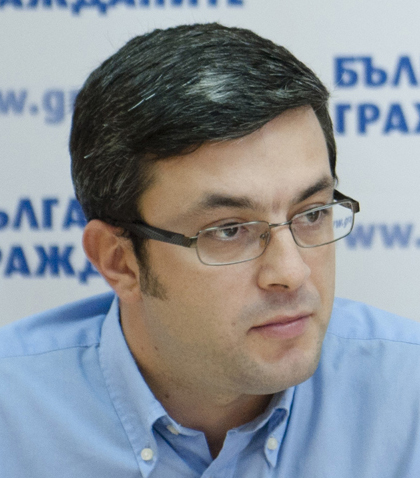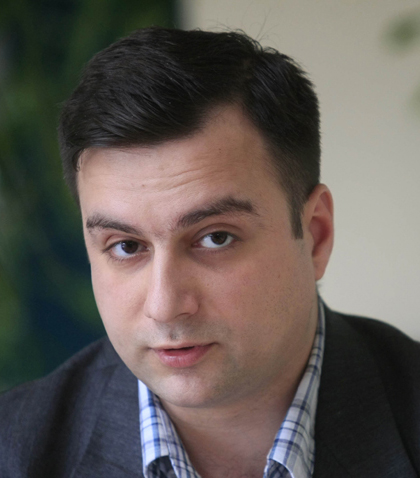The Scorpions’ and their Wind of Change, a song that came to be the symbol of the fall of the Berlin wall. Twenty-six years ago it sounded like the promise of a rosy future. Our dream was a simple one – to have this same wind of change blowing through this country.
Twenty-six years ago, one day after the Berlin wall fell, dictator Todor Zhivkov was ousted after spending more than three decades at the helm of the country. Back then we believed this marked the end of a time when a small group of people robbed everyone else, in the name of a future communism. We believed that at long last, the work of the willing and able would be judged by its merits. And that they would make Bulgaria into “Switzerland on the Balkans”. But what happened?
Every year on 10 November Bulgarians go back to the choices they made. As the years went by, this date was tarnished and lost much of its luster. Much of the Bulgarian transition is controversial – its end but also its beginning. Should this beginning be taken as 10 November or perhaps 7 December, when the Union of Democratic Forces (UDF) was set up, or perhaps 15 January 1990, the starting date of the round table that discussed and carried through a number of steps – abolishment of article No.1 of the constitution that cemented the “guiding role of the Bulgarian Communist Party”, the depoliticization of the army, the courts and the prosecutor’s office, or 4 February 1997, when, after skirmishes in the streets around parliament building, the UDF took power.
But maybe the beginning goes even further back, to the time before 10 November 1989? The start and the finish of the transition may seem controversial, but who the players are now seems clearer than ever – party technocrats, people from the former security services and sportsmen. The agents of the “change” proved to be agents in a different sense altogether. So, how did the dreams born in the city squares come to nothing?
 “These “dreams” have been a bone of contention among people,” says Toma Bikov from the Institute for Right-wing Policy. “We each had our dreams. To begin with, the Bulgarian transition was put through by philosophers and not by economists, as was the case in Poland or the Czech Republic. That is the reason why it took us seven years to come to the realization that we are advancing towards capitalism. At the beginning, the UDF itself avoided this word. Inside the socialist party a debate was ongoing whether the “perestroika” of the socialist regime ought to be radicalized or whether we should stay where we are. To this day this is a debate that continues inside that party, with no end in sight. Society in Bulgaria was utterly unprepared for this process. And if we keep this fact in mind, it is safe to say that we have come a long way – the country is a member of NATO and the EU, whatever problems we may have. From now on, it is up to us whether we shall be capable of formulating dreams, because to my mind, one of the biggest problems of the 1990s was that we were unable to formulate our dream, outside the technical parameters which emerged later – membership of the EU and NATO.”
“These “dreams” have been a bone of contention among people,” says Toma Bikov from the Institute for Right-wing Policy. “We each had our dreams. To begin with, the Bulgarian transition was put through by philosophers and not by economists, as was the case in Poland or the Czech Republic. That is the reason why it took us seven years to come to the realization that we are advancing towards capitalism. At the beginning, the UDF itself avoided this word. Inside the socialist party a debate was ongoing whether the “perestroika” of the socialist regime ought to be radicalized or whether we should stay where we are. To this day this is a debate that continues inside that party, with no end in sight. Society in Bulgaria was utterly unprepared for this process. And if we keep this fact in mind, it is safe to say that we have come a long way – the country is a member of NATO and the EU, whatever problems we may have. From now on, it is up to us whether we shall be capable of formulating dreams, because to my mind, one of the biggest problems of the 1990s was that we were unable to formulate our dream, outside the technical parameters which emerged later – membership of the EU and NATO.”
 “When we say that it was philosophers who were behind the changes at the start of the Bulgarian transition, we should not forget the men of letters,” says on his part Dr. Boris Popivanov, lecturer at the St. Kliment Ohridski University, Sofia. “A social group that is no less dangerous, as Alexis de Tocqueville asserted in his “The Old Regime and the Revolution” 150 years ago, a group that impose their own unrealistic dreams on a reality that requires approaches of a very different kind. And, with some consternation, we discover the following maxim: Bulgaria is an odd country, in which everything changes over 10 years and nothing over 100. Refracted through this maxim, history serves us a paradox. We are marking 26 years since the fall of the Berlin wall, a symbol of the obliteration of the barriers between us. Yet in our day other walls are turning into symbols – the notorious wall put up between Serbia and Hungary, and all other walls studded across Europe to check the migrant crisis. We are reverting to those kind of symbols to assess the reality we are living in. In the Wind of Change, the Scorpions sing: Let your balalaika sing what my guitar wants to say. As an irony of history, the balalaika and the guitar are now in direct confrontation. We must come to realize that history has no end, and it does not conclude in 1989. Many things, deformed out of all recognition, can come back to haunt us and society must find the strength to resist such tendencies that drag us back into the past and point to no prospect for the future.”
“When we say that it was philosophers who were behind the changes at the start of the Bulgarian transition, we should not forget the men of letters,” says on his part Dr. Boris Popivanov, lecturer at the St. Kliment Ohridski University, Sofia. “A social group that is no less dangerous, as Alexis de Tocqueville asserted in his “The Old Regime and the Revolution” 150 years ago, a group that impose their own unrealistic dreams on a reality that requires approaches of a very different kind. And, with some consternation, we discover the following maxim: Bulgaria is an odd country, in which everything changes over 10 years and nothing over 100. Refracted through this maxim, history serves us a paradox. We are marking 26 years since the fall of the Berlin wall, a symbol of the obliteration of the barriers between us. Yet in our day other walls are turning into symbols – the notorious wall put up between Serbia and Hungary, and all other walls studded across Europe to check the migrant crisis. We are reverting to those kind of symbols to assess the reality we are living in. In the Wind of Change, the Scorpions sing: Let your balalaika sing what my guitar wants to say. As an irony of history, the balalaika and the guitar are now in direct confrontation. We must come to realize that history has no end, and it does not conclude in 1989. Many things, deformed out of all recognition, can come back to haunt us and society must find the strength to resist such tendencies that drag us back into the past and point to no prospect for the future.”
English version Milena Daynova
"You say you are Bulgarian, but you do not know Bulgarian" – this reproach from officials in Bulgaria has been faced by quite a few by our compatriots from the historical Bulgarian communities around the world. One of them is Bledar Alterziu from..
The survival of millions of people around the world, living in conditions of war, hunger, disease and immense despair, is at stake every day. We often approach immigrants from such countries with hostility rather than understanding. What they have..
Modernizing critical thinking skills, fact-checking skills and media literacy are essential for society, especially for young people in Bulgaria - the country with one of the lowest media literacy indices in the EU, reports the educational platform..

+359 2 9336 661
